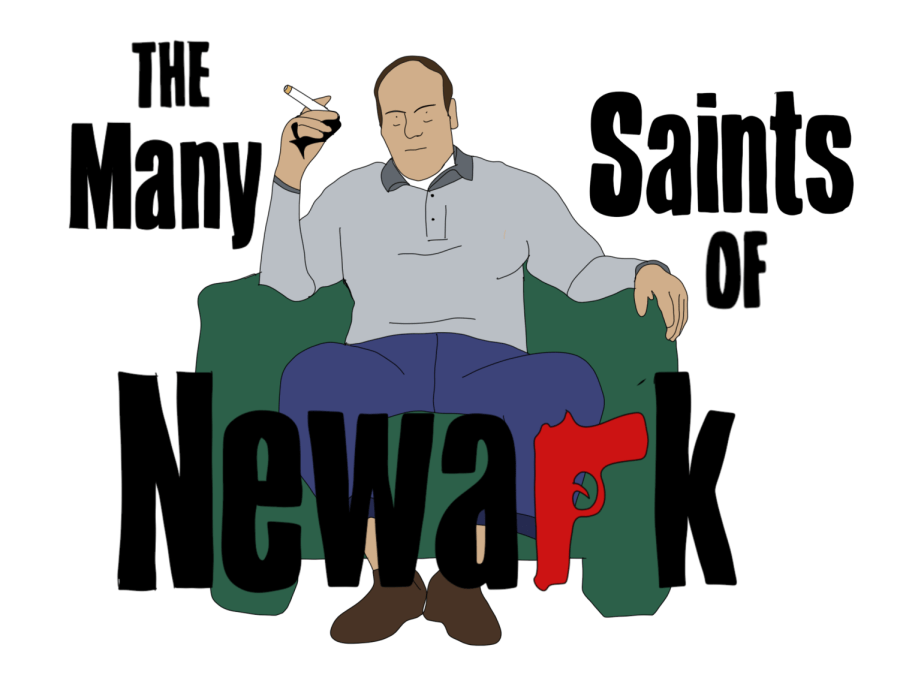‘The Many Saints of Newark’: A ‘Sopranos’ Story?
An all-too-often reminder of why iconic stories and characters are best left untouched
Like many continuations of iconic stories, “The Many Saints of Newark” simply couldn’t live up to the high expectations people had for it.
November 16, 2021
“The Sopranos” showrunner David Chase provided fans with another chance to connect with the iconic characters from the series with the prequel “The Many Saints of Newark,” released on Oct. 1, 2021.
Since the conclusion of the show, fans have been itching to know how Tony Soprano became the ruthless and intelligent mob boss he is infamously known to be in the series. After the project was announced, the expectations had only been rising given the presence and influence “The Sopranos” has had on modern television.
“The Sopranos” is considered by many to be the epitome of what television should represent because of its revolutionary impact on the way a television series could be told. Under HBO, “The Sopranos” did what other TV series couldn’t dare to do — craft high-budget episodes that mixed graphic violence and profanity with dark comedy.
Unfortunately, like many continuations of iconic stories, “The Many Saints of Newark” simply couldn’t live up to its high expectations.
For those who have never watched “The Sopranos,” it revolves around the psychology and actions of mob boss Tony Soprano. At the time of the release of “The Sopranos,” this was a bold strategy, as few series were centered around anti-heroes. The success of the anti-hero character arc in “The Sopranos” paved the way to success for other critically acclaimed shows like “Breaking Bad” and “Peaky Blinders,” which undoubtedly took inspiration from “The Sopranos.”
Unfortunately, like many continuations of iconic stories, “The Many Saints of Newark” simply couldn’t live up to its high expectations. The mix of comedy and violence so noticeable in “The Sopranos” was nowhere to be found, making it hard to believe that Chase had written the film. It was as if he didn’t know whether to tailor the film to fans or to new viewers. He was stuck between pleasing HBO, the fans and the masses, which turned into a jumbled mess of a screenplay and plot.
The question of “Who Made Tony Soprano?” was the focal point of pre-release posters and advertisements, which set up what viewers could expect to gain from watching “The Many Saints of Newark.” The film didn’t answer this question, and it spawned another recurring question in today’s film industry: “Why?”
Currently, in the film industry, prequels, sequels, remakes and adaptations dominate the mainstream box offices. They continue to be made because film producers and distributors see them as a means of earning revenues by milking as much money as they can out of a story. At worst, if these films cannot attract a new audience, the fans will still show up to the theaters so that they can reconnect with the characters and stories they love.
Disappointingly, “The Many Saints of Newark” failed to please both of its target audiences as a result of an unstructured plot and tone. Attempts to satisfy admirers of the series with appearances of fan-favorite characters like Paulie Walnuts, Silvio Dante and Junior Soprano felt forced and incomplete. Their comedic personalities did not fit in with the more serious tone and new characters in the film, making them feel like foreigners in a story where they were supposed to thrive. They deducted from the story instead of enhancing it, ultimately creating a mixed bag of emotions and nostalgia for fans.
For people who have never watched the series, the film will be mediocre at best as there is a lack of a general plot. The inclusion of characters from “The Sopranos” that made it so loveable comes off as, frankly, annoying.
Michael Gandolfini did a great job of portraying the unease, hidden intelligence and charm that his father had perfected in “The Sopranos.”
Fortunately, there were some positive takeaways from the film. It was very touching to see the son of the late James Gandolfini, Michael Gandolfini, play Tony Soprano, the character that defined his father’s career. Michael Gandolfini did a great job of portraying the unease, hidden intelligence and charm that his father had perfected in “The Sopranos.”
Another highlight was the acting of Alessandro Nivola, who played the lead role of Dickie Moltisanti. His character served as a role model to the young Tony Soprano, and it is clear through the acting of Nivola that Dickie had an influence on Tony’s actions as an adult. Nivola was able to capture the dual personality that Tony Soprano is so well known for — an energetic and compassionate character who can also be utterly ruthless and corrupt.
Hopefully, this will teach a lesson to film distributors that some stories are better off finished, as “The Many Saints of Newark” failed the audience that was the easiest to please — the fans.














